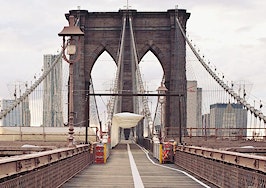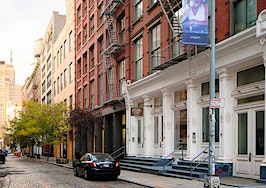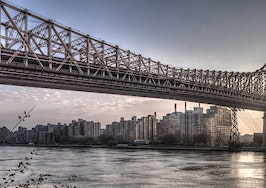- According to city documents, Phipps Houses wants to build 220 apartments with a 4,800 square foot preschool on the ground floor of 50-25 Barnett Ave.
- If approved, Phipps’ Barnett development would be one of the first MIH projects under Mayor Bill de Blasio’s recently sanctioned Housing New York plan.
- A petition by the Woodside & Sunnyside Neighborhood Affiliation garnered hundreds of signatures hoping to keep Sunnyside from residential growth sprawling over NYC’s landscape.
- Although Phipps’ new project was certified, it still has to go through the Community Board 2 and the Queens Borough President for approval, followed by a review by the NYC City Council.
In the wake of the City Council’s overwhelming approval of Mandatory Inclusionary Housing, zoning documents were filed on Monday for a 10-story affordable housing complex in Queens.
Phipps Houses, the oldest and largest non-profit developer in New York City, applied for a mixed-use development at 50-25 Barnett Ave. According to city documents, Phipps wants to build 220 apartments with a 4,800 square foot preschool on the ground floor.
In accordance with MIH, Phipps plans to exercise option 2 and rent 121 units to families who make 80 percent of the area’s median income (AMI) and 99 units for households earning up to 130 percent of the AMI. The project is slated for completion in 2018, pending approval.
[Tweet “Phipps plans to rent 121 units to families who make 80 percent of the area’s median income”]
If approved, Phipps’ Barnett development would be one of the first MIH projects under Mayor Bill de Blasio’s recently sanctioned Housing New York plan.
[graphiq id=”gy8bCemNHTf” title=”Northwestern Queens Queens, NY Profile” width=”600″ height=”591″ url=”https://w.graphiq.com/w/gy8bCemNHTf” link=”http://places.findthehome.com/l/140980/Northwestern-Queens-Queens-NY” link_text=”Northwestern Queens Queens, NY Profile | FindTheHome”]
The 10-story building was first introduced last June. Shortly after, a petition started by the Woodside & Sunnyside Neighborhood Affiliation in northwest Queens garnered hundreds of signatures from local residents, some stating their desire to keep Sunnyside from the mass residential growth sprawling over New York City’s landscape.
“The site is zoned for manufacturing, not for residential use. And for decades it’s been a much needed parking lot for 225 to 250 neighbors, including the 472 apartments in Phipps Gardens Apartments, where the Phipps corporation never provided parking,” the Sunnyside Gardens Preservation Alliance wrote on its website. “The proposed new building would tower at least twice the height of the tallest adjacent buildings and bring more crowding and congestion of every kind, including increased traffic and parking woes, [as well as] threats to safety and quiet.”
Upon receiving pushback from the community after the proposals became public because of parking, traffic and height concerns, Phipps, Councilman Jimmy Van Bramer and Community Board 2 held a town hall meeting in October, the Sunnyside Post reported.
The current site, a 215-space parking lot used by residents and small business surrounding the zone, would be eliminated to accommodate the new structure. However, Phipps plans to incorporate an open parking lot with 101 spots, even though ZQA laws do not require parking in affordable housing units near the subway. Sunnyside Yards is only a half mile from the 52nd Street subway stop.
Phipps built the affordable housing development across the street, Sunnyside Gardens, over 75 years ago. The building features 472 units within a mix of six-story elevator buildings and four-story walkups. Phipps renovated the complex within the past decade, upgrading kitchens and converting to energy-efficient systems. Sunnyside Gardens studio apartments start at $1,400, one-bedrooms at $1,800, two-bedrooms at $2,200 and three-bedrooms at $3,300 per month.
Although Phipps’ new project was certified, it still has to go through the Community Board 2 and the Queens Borough President for approval. From there, the Department of City Planning will review the proposal before the NYC City Council makes the final decision. The whole process takes six months and, if authorized, the City Council will decide what income levels the development will support through public funding.




